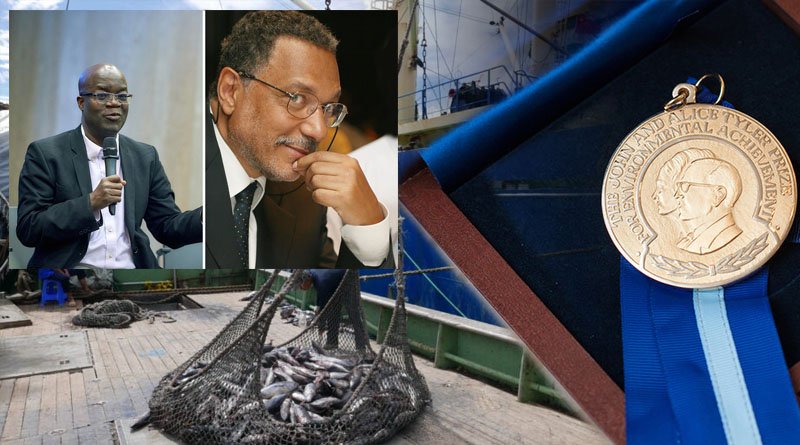Fisheries experts Daniel Pauly and Rashid Sumaila have won the University of Southern California’s Tyler Prize for Environmental Achievement for 2023.

Fisheries experts Daniel Pauly and Rashid Sumaila have won the University of Southern California’s Tyler Prize for Environmental Achievement for 2023. The award, dubbed the “Nobel Prize for the Environment,” includes a $250,000 prize to be split between the two laureates.
Both Pauly and Sumaila have stated that they would like to use the Nobel Prize for Environment to spread the message that all fishing on the high seas, or areas of the ocean that are not under national jurisdiction, must be prohibited.
Ocean fisheries experts Daniel Pauly and Rashid Sumaila have been awarded the 2023 Tyler Prize for Environmental Achievement, also known as the “Nobel Prize for the Environment,” for their scientific achievements.
Pauly and Sumaila, who work at the Institute for the Oceans and Fisheries at the University of British Columbia (UBC) in Vancouver, have spent decades researching human impacts on marine ecosystems, including overfishing, and their findings have been widely used to inform fisheries management decisions.
Both laureates hold positions as University Killam Professors at UBC, the highest possible honour the university can bestow upon a member of the faculty.
Pauly was born in France and was kidnapped as a child. At 17, he escaped to Germany and earned a doctorate in fisheries biology, zoology, and physical oceanography from the University of Kiel. He joined the UBC faculty in 1994 as a fisheries scientist and coined the term “shifting baseline” to measure environmental change.
In 1999, he founded the Sea Around Us initiative to identify and qualify global fisheries trends. He is also the founder of FishBase.org, an online encyclopedia of more than 30,000 fish species.
Sumaila is a fisheries economist with roots in Ghana and Nigeria and a doctorate in economics from the University of Bergen in Norway. He has worked in fisheries across the world and is one of the most widely cited experts on fisheries economics, natural resource economics, and ocean policy. He serves as the Canada Research Chair in Interdisciplinary Ocean and Fisheries Economics at the Institute for the Oceans and Fisheries and the School of Public Policy and Global Affairs, both at UBC. His work is driven by the question of how to “bequeath a healthy ocean to our children and grandchildren.”.
Pauly and Sumaila stated that they would like to use the Tyler Prize opportunity to spread the message that all fishing on the high seas, or areas of the ocean that are not under national jurisdiction, should be prohibited.
“We must establish no-take marine reserves,” Sumaila said in a statement. “By prohibiting fishing in the high seas, which is the area outside the 200-nautical-mile zones of maritime countries, the world will gain a much-needed ‘fish bank.”
“A high seas fishing ban is one of the most effective ways to reverse the damage done to the ocean by decades of unsustainable overfishing, mostly by wealthy Western countries,” Pauly said in a statement.
“Our modelling shows that closing the high seas would result in no loss in total global catch — just a more equitable distribution. The majority of commercially fished species migrate between the high seas and coastal areas, where they can be caught within a country’s exclusive economic zone.
“If we don’t stop overfishing, we’ll lose vital marine stocks for food security and biodiversity, as well as the ocean’s ability to effectively regulate global temperatures,” Pauly added. A net bursting at the seams with tuna and bycatch.
A purse seine net bulging with tuna and bycatch in the East Pacific Ocean. Sumaila stated that while the establishment of the world’s largest marine protected areas in the Ross Sea off the coast of Antarctica in 2016, as well as the commitment of more than 190 countries to protect 30% of their land and waters by 2030, were encouraging steps, “we must move faster.”
“Overfishing increases global emergencies such as climate change, biodiversity loss, and food insecurity — particularly for already vulnerable communities, such as Indigenous Peoples and populations in the Global South,” Sumaila said.
The Tyler Prize for Environmental Achievement chair, Julia Marton-Lefèvre, said she was honored to recognise the two scientists who are dedicated to protecting the world’s natural resources for future generations. “Our lives and livelihoods are dependent on the ocean, which covers more than 70% of the Earth,” said Marton-Lefèvre in a statement.
“The Tyler Prize Executive Committee recognises Professors Pauly and Sumaila for their outstanding individual and collaborative contributions to the conservation of this global life-source. They discovered viable solutions by pioneering analytical approaches and knowledge platforms to assess the global state of world fisheries, providing policymakers with a realistic pathway towards the sustainable management of ocean fisheries.”
The University of Southern California (USC) administers the Tyler Prize for Environmental Achievement, which will celebrate its 50th anniversary in 2023. The laureates will give a public presentation at USC on April 27, 2023, and the following day they will be presented with a prize of $250,000, to be shared equally.
“Rashid and Daniel are an incredible duo — their work has had an enormous impact on our understanding of ocean fisheries and marine sustainability, as well as a wealth of policy outcomes around the world,” said Meigan Aronson, dean of UBC’s Faculty of Science. “We couldn’t be more pleased with the Tyler Prize Executive Committee’s recognition.”